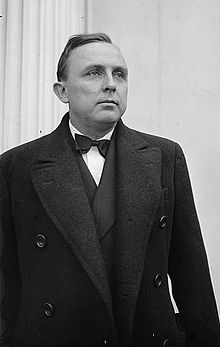Eurith D. Rivers
Eurith D. Rivers | |
|---|---|
 E.D. Rivers visits the White House as Georgia's governor-elect on December 22, 1936. | |
| 68th Governor of Georgia | |
| In office January 12, 1937 – January 14, 1941 | |
| Preceded by | Eugene Talmadge |
| Succeeded by | Eugene Talmadge |
| Speaker of the Georgia House of Representatives | |
| In office 1933–1937 | |
| Member of the Georgia House of Representatives | |
| In office 1924 | |
| Member of the Georgia Senate | |
| In office 1926 | |
| Personal details | |
| Born | Eurith Dickinson Rivers December 1, 1895 Center Point, Arkansas, U.S. |
| Died | June 11, 1967 (aged 71) Atlanta, Georgia, U.S. |
| Nationality | American |
| Political party | Democratic |
| Spouse(s) | Mattie Lucille Lashley[1] |
| Children | Eurith Dickinson Rivers Jr. and Geraldine[1] |
| Parents | Millie Annie Wilkerson and James Matthew Rivers[1] |
| Alma mater | Young Harris College LaSalle Extension University[1] |
| Profession | Attorney and newspaper editor[1] |
Eurith Dickinson Rivers (December 1, 1895 – June 11, 1967), commonly known as E.D. Rivers and informally as "Ed" Rivers, was an American politician from Lanier County, Georgia. A Democrat, he was the 68th Governor of Georgia, serving from 1937 to 1941.
Early life and education[]
Eurith Dickinson Rivers was born on December 1, 1895, in Center Point, Arkansas. He attended Young Harris College in North Georgia and settled in Cairo in South Georgia. Rivers also obtained a law degree through La Salle Extension University.[2] Rivers served as a Justice of the Peace, Cairo City Attorney, and Grady County Attorney. He later moved to another South Georgia community, Milltown (now called Lakeland), to become editor of the Lanier County News.
Career[]
Rivers was elected to the Georgia House of Representatives in 1924 and to the Georgia State Senate in 1926. During this time, he was a member of the Ku Klux Klan.[1] In 1928 and 1930, Rivers was an unsuccessful candidate for the Democratic nomination for Governor. In 1932, he ran for the Georgia House of Representatives. He was elected Speaker of the Georgia House of Representatives, serving from 1933 to 1937.
His election as governor came after a stormy Democratic primary in 1936 in which the race served as a surrogate referendum on US President Franklin Roosevelt's New Deal. Since Georgia did not allow three consecutive terms, Governor Eugene Talmadge was not eligible for re-election.[3] Talmadge, who strongly opposed the New Deal and had delayed its implementation in Georgia, ran for the US Senate and backed Charles D. Redwine for governor. Rivers, who, as Speaker, had strongly supported the New Deal, was his opponent and won with about 60 percent of the vote, the same margin by which Talmadge lost his Senate race.
Rivers' first two-year term as governor saw Georgia pass the legislation required to bring New Deal programs into the state, and was widely acclaimed. Rivers created the 7-month school year. Under Rivers' leadership, electrical services were expanded to rural areas of the state. Georgia moved from the lowest-ranked state to the top of the list in the number of rural electrification associations. When he was in office, the State Bureau of Unemployment Compensation was created, allowing Georgians to receive unemployment benefits.
After Rivers' re-election in 1938, he ran into problems financing many of his improvement programs. Although the budget was reduced by 25 percent, he was able to convince the legislature to create the Georgia Housing Authority and obtain federal funds to build public housing. During Rivers' second term, there were political scandals and charges of corruption. Many of Rivers' appointees and staff members were charged with corrupt practices, and the charges reflected poorly on the governor.
In 1939, Rivers proclaimed a state holiday for the December premiere of the film Gone With the Wind.[4]
Rivers sought the governorship again in 1946 but finished a distant third behind Eugene Talmadge and James V. Carmichael in the Democratic primary.[1]
Later life and death[]
Rivers was never again elected to public office. He became a successful radio station owner.[1] He died in Atlanta, Georgia, in 1967 and is buried in the City Cemetery in Lakeland, Georgia.
Rivers is the most recent Georgia governor to have been born outside the state.
See also[]
- List of Governors of Georgia
- List of Speakers of the Georgia House of Representatives
References[]
- ^ Jump up to: a b c d e f g h "E. D. Rivers (1895-1967)". New Georgia Encyclopedia.
- ^ Georgia Dept. of Archives and History (1925). Georgia's official register. Longino and Porter
- ^ "Eugene Talmadge, and newly-elected Governor R.D. Rivers shaking hands at inauguration, Atlanta, Georgia, January 12, 1937". Special Collections and Archives, Georgia State University Library. Digital Library of Georgia. Retrieved 21 June 2016.
- ^ "Arrival for Gone With the Wind Movie Premiere Festivities, Dec. 15, 1939". Atlanta History Photograph Collection, Atlanta History Center. Digital Library of Georgia. Archived from the original on 1 July 2016. Retrieved 21 June 2016.
External links[]
| Wikimedia Commons has media related to Eurith D. Rivers. |
| Wikiquote has quotations related to: Georgia (U.S. state) |
- 1895 births
- 1967 deaths
- People from Howard County, Arkansas
- Governors of Georgia (U.S. state)
- Members of the Georgia House of Representatives
- Georgia (U.S. state) state senators
- Georgia (U.S. state) Democrats
- Georgia (U.S. state) lawyers
- Ku Klux Klan members
- Young Harris College alumni
- La Salle Extension University alumni
- Democratic Party state governors of the United States
- People from Lanier County, Georgia
- 20th-century American politicians
- Speakers of the Georgia House of Representatives
- 20th-century American lawyers
- American white supremacists
